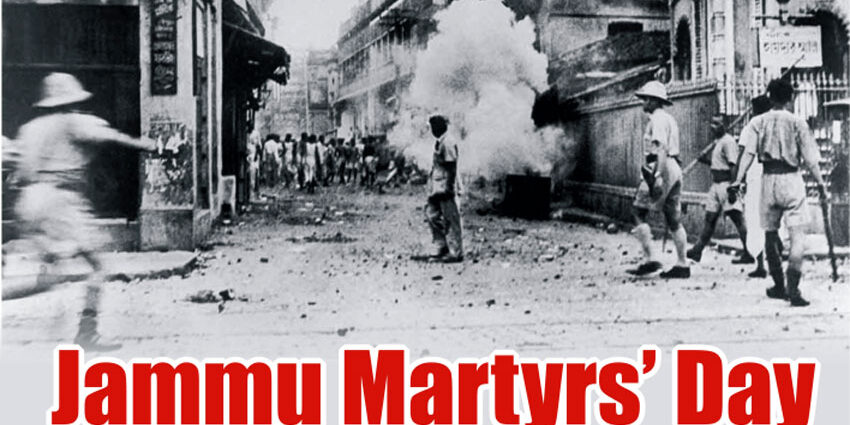Youm e Shuhada: Remembering the Jammu Martyrs of November 6, 1947
The people of Pakistan and Kashmir pay a tribute on November 6 every year to Youm-e-Shuhada-e-Jammu, the Day of the Jammu Martyrs. This is also one of the worst days in the history of the region, as hundreds of thousands of Muslims were massacred in Jammu in 1947. They are martyrs of one of the most disastrous tragedies in the post-partition upheaval in the subcontinent, whose sacrifice has been permanently embedded in the memory of the Kashmiris worldwide.
The November 1947 tragedy has to be viewed within the larger realm of the Partition of British India. With the end of the British colonial rule, the sub-continent was partitioned into two independent states, India and Pakistan. Political tension and conflict took center stage in the princely state of Jammu and Kashmir, which was governed by Maharaja Hari Singh. Although with a majority of the Muslim population, the Hindu ruler was not ready to surrender to either of the dominions, resulting in great confusion and instability.
In the tense and uncertain situation across the subcontinent, common emotions and concerns grew stronger. In Jammu, this took a tragic turn as the Indian forces and extremist groups were reported to have carried out a planned campaign of violence and ethnic cleansing against the Muslim population. Eyewitnesses and historical records state that between 200,000 and 250,000 Muslims were killed or forced to leave their homes between late October and early November 1947, with many fleeing towards the areas that became Pakistan.
November 6, 1947, was the most horrific day of this tragedy. Unarmed thousands of Muslims from other regions of Jammu were rounded up on the pretext of safe passage to Pakistan. They had been formed in columns and marched off towards Sialkot when trapped on the road. Men, women, and children were brutally killed and their bodies scattered along the road. The incident was not only a massacre but a bid to wipe centuries-old Muslim population in huge regions of Jammu. There is some historical evidence of the complicity of parts of the Dogra administration in the planning of these atrocities. The Jammu massacre has been framed by British correspondents, later historians, and those who survived that time as one of the most terrible incidents of communal violence throughout the Partition period. It also caused the displacement of at least half a million Muslims, many of whom were to become refugees in Pakistan, and who could never go back to their ancestral homes.
Youm-e-Shuhada-e-Jammu is not only a memory of tragedy, but it is a redefinition of resilience and identity. November 6 is marked by Kashmiris all over the world each year to honor the dead and to remind people of the unfulfilled political ambitions of the people of Jammu and Kashmir. Here, ceremonies are organized in Azad Jammu and Kashmir, Pakistan, and in the diaspora communities around the world, which include prayers, memorial meetings, and seminars that retrace the events of 1947.
Demonstrations in the segments of Jammu and Kashmir that are occupied by India are usually suppressed. However, the memory of the martyrs is preserved by the collective narrations, oral history, and cultural manifestations that are transferred to new generations. The day serves as an indicator that there will never be peace and justice in the region without the recognition of the suffering of the past and the grievances that have resulted from it.
For decades, the Jammu massacre received little international attention, overshadowed by other aspects of the Partition and the subsequent wars between India and Pakistan. However, scholars and human rights organizations have increasingly called for a fuller acknowledgment of what occurred. They emphasize that remembering the Jammu martyrs is not an act of political partisanship, but a moral obligation, a commitment to truth and reconciliation.
Documenting the tragedy also carries a broader lesson about the perils of communal hatred and state complicity in violence. It underscores the importance of safeguarding minority rights and preventing the repetition of such atrocities anywhere in the world. For historians, journalists, and policymakers, November 6 stands as a solemn reminder of how unchecked intolerance and political expediency can devastate entire communities.
Youm-e-Shuhada-e-Jammu is, above all, a day of reflection not only for the people of Jammu and Kashmir but for humanity as a whole. It calls for compassion over prejudice, justice over silence, and remembrance over oblivion. As Kashmiris pay tribute to the martyrs of November 6, 1947, they renew their collective pledge to strive for dignity, self-determination, and peace.
Seventy-eight years later, the wounds of 1947 have not entirely healed, but the memory of the Jammu martyrs continues to inspire generations. Their sacrifice is a stark testament to the human cost of political decisions made without regard for justice and humanity. In remembering them, we reaffirm a timeless truth: that the quest for peace must always begin with remembrance and the pursuit of truth.
About the Author: Zaib Yaqoob Minhas is a final-year BS Public Administration student at Riphah International University and a Research Intern at the Kashmir Youth Forum, Islamabad. Her research focuses on raising awareness about the Kashmir issue and highlighting human rights violations in the region.
- Socio-Economic Transformation in Kashmir, Post-Article 370: Never Ending Anxieties Of Kashmiris - December 23, 2025
- Youm e Shuhada: Remembering the Jammu Martyrs of November 6, 1947 - November 14, 2025
- DECODING THE FICTION OF INSTRUMENT OF ACCESSION - September 30, 2025







